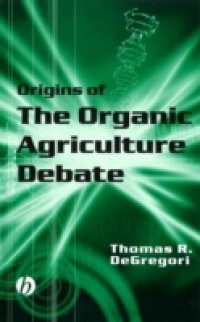Origins of the Organic Agriculture Debate takes an historical look at two contrasting streams of ideas. The first view comprises the flow of ideas in chemistry and biology that have created the conditions for modern medicine, modern food production and the biotechnological revolution. The second view is the "vitalist" reaction to the rise of modern science and the resulting rejection of modern agriculture. Contemporary proponents of "organic" agriculture and the anti-genetically modified food movement believe that "pure" food confers some special kind of virtue both on those who produce it and those who consume it. They fail to acknowledge that organic chemistry, genetics, and molecular biology have been as essential to twentieth century advances in agriculture such as plant breeding, and are instrumental to ensuring that there is enough food for everyone. Origins of the Organic Agriculture Debate Begins with an exploration of the factors involved in our modern fear of technology, a fear which forms the foundation for anti-technology beliefs and practices. Argues that vitalism is at the core of an array of contemporary anti-science and anti-technology movements. Helps readers fully understand the ferocity with which certain beliefs about homeopathic medicine and the "organic" are held against all evidence to the contrary. Explains the history of nitrogen in life and in agriculture, countering myths of scarce resources and beliefs about the sufficiency of organic nitrogen to feed the world s population. Purports that technology creates resources, debunking the idea that resources are natural, fixed and finite. Updates and clarifies issues discussed in the author's previous works: A Theory of Technology (1985), Agriculture and Modern Technology (2001) and The Environment, Our Natural Resources and Modern Technology (2002). We need to better understand the forces of scientific and technological change if we are to control the negative elements of these forces, continue to advance the development of science and technology, and facilitate fuller participation in the benefits of our advancing capability to further the human endeavor. Origins of the Organic Agriculture Debate will provide a basis for this understanding.

